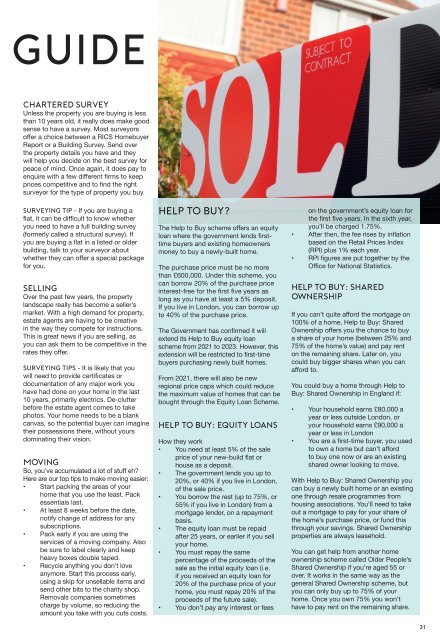Newmarket and Ely Living Dec 2019 - Jan 2020
The fantastic festive issue is here, packed with local events, Christmas fun, delicious recipes, chef Michael Caines plus travel to Oman and advice on buying a new home.
The fantastic festive issue is here, packed with local events, Christmas fun, delicious recipes, chef Michael Caines plus travel to Oman and advice on buying a new home.
Create successful ePaper yourself
Turn your PDF publications into a flip-book with our unique Google optimized e-Paper software.
GUIDE<br />
CHARTERED SURVEY<br />
Unless the property you are buying is less<br />
than 10 years old, it really does make good<br />
sense to have a survey. Most surveyors<br />
offer a choice between a RICS Homebuyer<br />
Report or a Building Survey. Send over<br />
the property details you have <strong>and</strong> they<br />
will help you decide on the best survey for<br />
peace of mind. Once again, it does pay to<br />
enquire with a few different firms to keep<br />
prices competitive <strong>and</strong> to find the right<br />
surveyor for the type of property you buy.<br />
Surveying Tip - If you are buying a<br />
flat, it can be difficult to know whether<br />
you need to have a full building survey<br />
(formerly called a structural survey). If<br />
you are buying a flat in a listed or older<br />
building, talk to your surveyor about<br />
whether they can offer a special package<br />
for you.<br />
SELLING<br />
Over the past few years, the property<br />
l<strong>and</strong>scape really has become a seller’s<br />
market. With a high dem<strong>and</strong> for property,<br />
estate agents are having to be creative<br />
in the way they compete for instructions.<br />
This is great news if you are selling, as<br />
you can ask them to be competitive in the<br />
rates they offer.<br />
Surveying Tips - It is likely that you<br />
will need to provide certificates or<br />
documentation of any major work you<br />
have had done on your home in the last<br />
10 years, primarily electrics. De-clutter<br />
before the estate agent comes to take<br />
photos. Your home needs to be a blank<br />
canvas, so the potential buyer can imagine<br />
their possessions there, without yours<br />
dominating their vision.<br />
MOVING<br />
So, you’ve accumulated a lot of stuff eh?<br />
Here are our top tips to make moving easier:<br />
• Start packing the areas of your<br />
home that you use the least. Pack<br />
essentials last.<br />
• At least 8 weeks before the date,<br />
notify change of address for any<br />
subscriptions.<br />
• Pack early if you are using the<br />
services of a moving company. Also<br />
be sure to label clearly <strong>and</strong> keep<br />
heavy boxes double taped.<br />
• Recycle anything you don’t love<br />
anymore. Start this process early,<br />
using a skip for unsellable items <strong>and</strong><br />
send other bits to the charity shop.<br />
Removals companies sometimes<br />
charge by volume, so reducing the<br />
amount you take with you cuts costs.<br />
Help to Buy?<br />
The Help to Buy scheme offers an equity<br />
loan where the government lends firsttime<br />
buyers <strong>and</strong> existing homeowners<br />
money to buy a newly-built home.<br />
The purchase price must be no more<br />
than £600,000. Under this scheme, you<br />
can borrow 20% of the purchase price<br />
interest-free for the first five years as<br />
long as you have at least a 5% deposit.<br />
If you live in London, you can borrow up<br />
to 40% of the purchase price.<br />
The Government has confirmed it will<br />
extend its Help to Buy equity loan<br />
scheme from 2021 to 2023. However, this<br />
extension will be restricted to first-time<br />
buyers purchasing newly built homes.<br />
From 2021, there will also be new<br />
regional price caps which could reduce<br />
the maximum value of homes that can be<br />
bought through the Equity Loan Scheme.<br />
Help to Buy: Equity loans<br />
How they work<br />
• You need at least 5% of the sale<br />
price of your new-build flat or<br />
house as a deposit.<br />
• The government lends you up to<br />
20%, or 40% if you live in London,<br />
of the sale price.<br />
• You borrow the rest (up to 75%, or<br />
55% if you live in London) from a<br />
mortgage lender, on a repayment<br />
basis.<br />
• The equity loan must be repaid<br />
after 25 years, or earlier if you sell<br />
your home.<br />
• You must repay the same<br />
percentage of the proceeds of the<br />
sale as the initial equity loan (i.e.<br />
if you received an equity loan for<br />
20% of the purchase price of your<br />
home, you must repay 20% of the<br />
proceeds of the future sale).<br />
• You don’t pay any interest or fees<br />
on the government’s equity loan for<br />
the first five years. In the sixth year,<br />
you’ll be charged 1.75%.<br />
• After then, the fee rises by inflation<br />
based on the Retail Prices Index<br />
(RPI) plus 1% each year.<br />
• RPI figures are put together by the<br />
Office for National Statistics.<br />
Help to Buy: Shared<br />
Ownership<br />
If you can’t quite afford the mortgage on<br />
100% of a home, Help to Buy: Shared<br />
Ownership offers you the chance to buy<br />
a share of your home (between 25% <strong>and</strong><br />
75% of the home’s value) <strong>and</strong> pay rent<br />
on the remaining share. Later on, you<br />
could buy bigger shares when you can<br />
afford to.<br />
You could buy a home through Help to<br />
Buy: Shared Ownership in Engl<strong>and</strong> if:<br />
• Your household earns £80,000 a<br />
year or less outside London, or<br />
your household earns £90,000 a<br />
year or less in London<br />
• You are a first-time buyer, you used<br />
to own a home but can’t afford<br />
to buy one now or are an existing<br />
shared owner looking to move.<br />
With Help to Buy: Shared Ownership you<br />
can buy a newly built home or an existing<br />
one through resale programmes from<br />
housing associations. You’ll need to take<br />
out a mortgage to pay for your share of<br />
the home’s purchase price, or fund this<br />
through your savings. Shared Ownership<br />
properties are always leasehold.<br />
You can get help from another home<br />
ownership scheme called Older People’s<br />
Shared Ownership if you’re aged 55 or<br />
over. It works in the same way as the<br />
general Shared Ownership scheme, but<br />
you can only buy up to 75% of your<br />
home. Once you own 75% you won’t<br />
have to pay rent on the remaining share.<br />
31


















